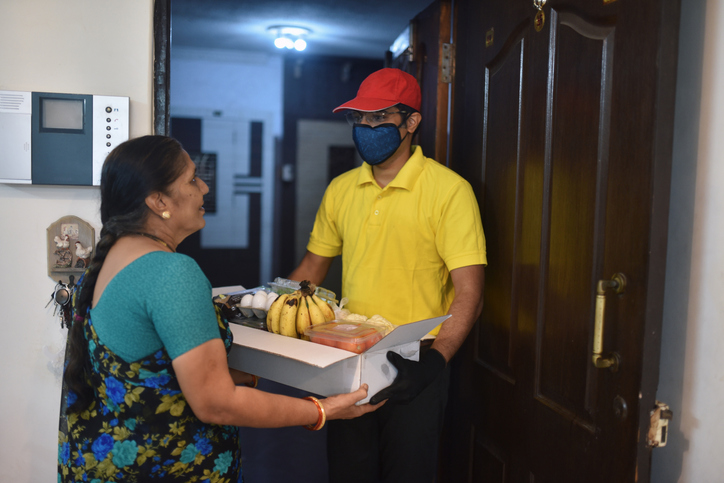With the pandemic necessitating frequent shutdowns of dine in options, cloud kitchens are becoming more prominent, successfully expanding in the food delivery market
In 2003, two friends from Calcutta – Kallol Banerjee and Jaydeep Barman spent time reminiscing about their childhood days and the lip-smacking street food in Calcutta. That’s when the idea hit them, bring a chef from the streets of Calcutta and establish an outlet that provides delicious wraps and rolls and in Pune. Thus, Faasos now REBEL Foods, was born.
By 2011, REBEL Foods had set up 18 outlets around India, soon jumping on the online bandwagon they began competing with bigwigs like McDonald’s and Dominos. With business booming, soon they introduced their second outlet, Behrouz Biryani.
Now, both rolls and biryani production was taking place under one roof but sold under different brand names. In no time, they could add a plethora of over eight brands, including OvenStory Pizza, to their repertoire. If you thought these brands were different restaurants that physically exist, it’s a mistake.
When food is delivered at your doorstep, you tend to assume that it originates from a full-fledged restaurant. However, with the change in times, including the pandemic, that’s increasingly not the case. This brings us to the cloud kitchenconcept. Without the mumbo jumbo, simply put, the premise of a cloud kitchen, also known as dark, ghost or virtual kitchens, is simple. It’s a fully equipped kitchen space to cook one or many cuisines under the same roof with no dining or storefront. It’s a phone/online delivery-only service via aggregators such as Swiggy or Zomato or the kitchen’s delivery system. Some cloud kitchens may have physical outlets, but essentially they’re backed by a chain of cloud kitchens or a base kitchen. From $400 million in 2019, the cloud kitchen industry is projected to become a $2 billion industry by 2024 in India, according to RedSeer Management Consulting.
So, what are the magic sauce cloud kitchens dip into and why are they gaining traction? Since the pandemic set in along with the various restrictions, takeaway meal options have been booming in India. But Covid-19 isn’t solely accountable for this seismic shift, it has merely a catalyst that accelerated this change. Long before Covid-induced lockdowns, the online delivery market was growing fuelled by the craving for convenience and having the chance to eat every cuisine imaginable from popular restaurants across the city from the comfort of your home.
The food service is an industry that has high overheads and from a business point of view, cloud kitchens eliminate brick and mortar-related costs like rent for a prime location, cost of construction, a well-equipped ambience, training and upkeep of front-of-house staff, and maintenance expenses. Comparatively, cloud kitchens have low margins and need lesser working capital. With less focus on dining space, maintenance cost, designing, furniture, large staff, etc. kitchens can pivot the heart of their kitchen to a better quality of food.
To add to the above, cloud kitchens can take more orders in a day as compared to a dine-in restaurant, which spikes the volume and higher revenue per square foot. Similarly, cloud kitchens can run multiple brands from the same kitchen and serve a larger demographic at the same time. Plus, with limited interaction, the question of poor service is out the window and the food can speak for itself.
During the pandemic, the relevance of such a set-up has increased manifold, as its excellent method to keep a business afloat while maintaining social-distancing guidelines. Simply put, with cloud kitchens, the number of risks is comparatively lower and they provide a cost-friendly model that helps prepare food with minimal investment tackling the supply gap.
Challenges facing cloud kitchens
If you get your products right, you may be able to cook your way to millions. But this very fact poses a few challenges. While cloud kitchens save on labour and rent, the true expense is marketing. Typically, food aggregators charge 20 to 40% as commission. Over and above, cloud kitchens have to ensure a multitude of factors are in places like food quality and safety, competitive price, attractive packaging, top-notch hygiene, fresh delivery, etc. to meet customer expectations, acquire new customers, rank higher in third-party apps and earn good ratings. Building a successful cloud kitchen is not easy and needs continuous attention to detail along with up-to-date marketing and technology solutions.
The future
Apart from big players like Rebel Foods which has grown to become one of the world’s largest internet restaurant companies, the cloud has space for small, local players and home cooks too. In the current environment and with the continued uncertainty of the Covid-19 pandemic, cloud kitchens backed by a cloud kitchen network have a better chance of survival and have carved a bigger path for this concept to thrive.
It will take some time for restaurants to return to catering customers in the pre pandemic style. Until then, cloud kitchens are an excellent way to provide customers with a safe and easily accessible method to enjoy a variety of foods. Sure, the food and beverage industry is one of the largest in the service sector, and a few upcoming businesses will emerge as unicorns but, will they surpass dine-in restaurants? What the future holds only time will tell. In this time, to keep afloat, when you can’t change the direction of the wind – adjust your sails.
The writer is from The British School, New Delhi.

